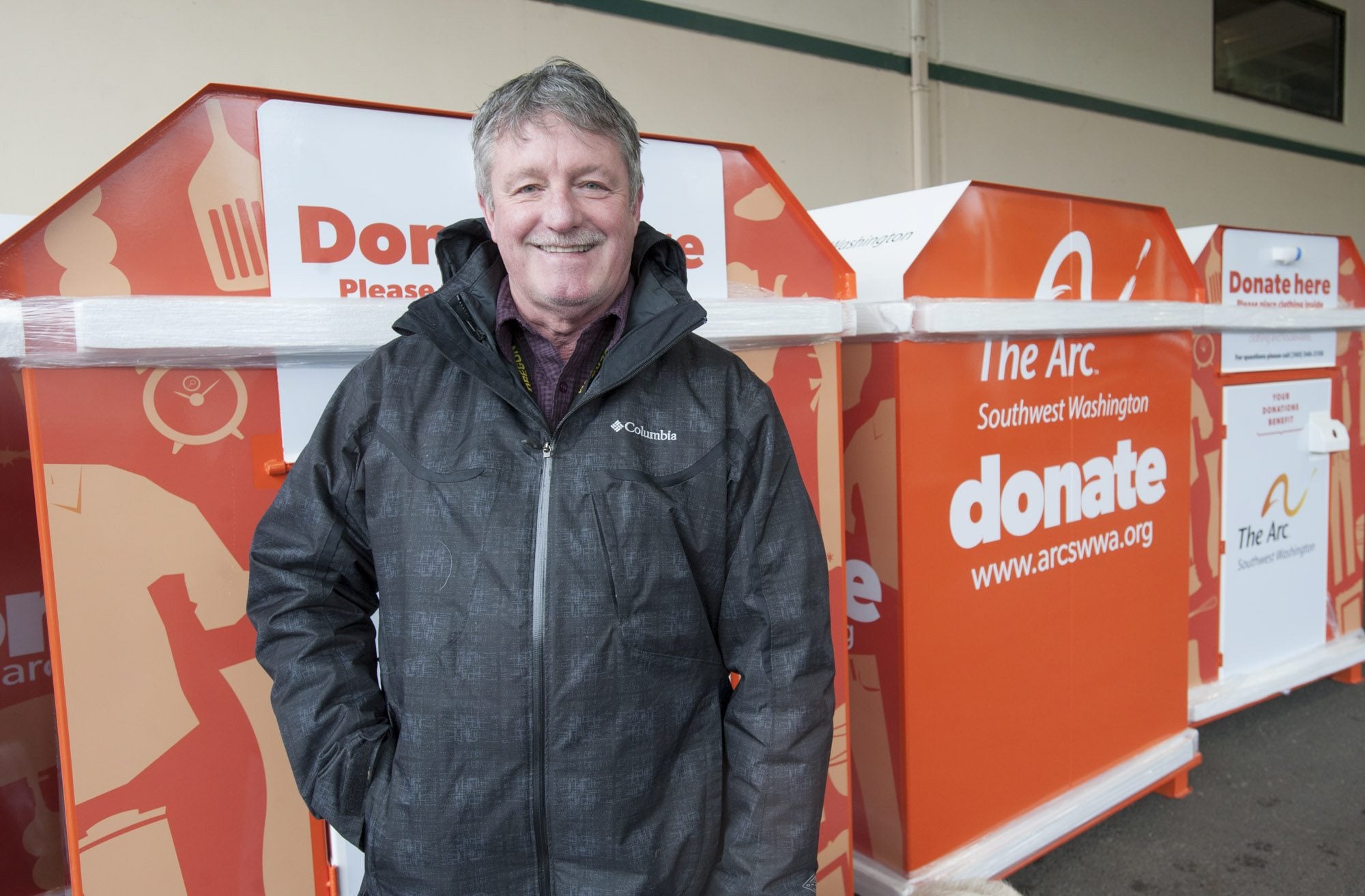Driving around Clark County this week, some unfamiliar pops of orange might catch your eye. What is that? Is that a bright orange box?
The Arc of Southwest Washington is replacing its old white and blue donation collection bins with new, orange ones emblazoned with an upgraded logo and patterned with images of clothing and household goods — the kind of donations it accepts. The Vancouver-based nonprofit, which serves people with intellectual and developmental disabilities, is rolling out 22 new bins later this week.
“We think they’ll stand out,” said Michael Piper, The Arc’s executive director.
Currently, there are bins as far east as Washougal and as far north as Kalama awaiting donations of clothing and household goods. The most profitable bin is in Woodland.
About 65 percent of the revenue supporting The Arc’s programming comes from selling donated goods to Savers, a Bellevue-based company that operates Value Village at Northeast Fourth Plain Boulevard and Andresen Road. The Arc gets almost 42 cents for every pound of clothing that’s donated, Piper said; previously, the agency got 43 cents. The Arc gets 16 cents per pound for household goods. That money goes toward programs that help those with autism, Down syndrome, Fragile X syndrome and other disabilities.
Donations needed
The Arc’s main drop-off location is 6511 N.E. 18th St. in central Vancouver. Visit www.arcswwa.org/involvedwithus/donations for a map of all the bin locations. Accepted donation items include:
• Clean clothing and textiles.
• Scarves, purses, belts and shoes.
• Bed, bath and kitchen linens.
• Small rugs.
• Small household items, toys and decorations.
• Kitchenware.
The blue-and-white logo has been retired for years by The Arc’s parent organization. As part of a national rebranding effort launched in 2008, The Arc of the United States nixed the old blue-and-white logo featuring a bird and replaced it with a more modern-looking logo with an orange swoop.
Over time, the white and blue bins have gotten worn out and broken into. Those who collect the donations have occasionally found people sleeping in the bins, Piper said. People won’t be able to get into the new bins, which feature locks that can’t be cut by bolt cutters, he said.
Eventually, Piper would like to get all of the trucks that pick up donations rebranded as well. He’s interested in putting bins at schools, which could share the proceeds with The Arc.
Piper knows there are a lot of different clothing bins throughout Clark County benefiting different agencies. He encourages people to look at the fine print and understand where the money goes, what it supports and how much is actually going to a nonprofit as opposed to a for-profit entity.
Some of the more popular programs at The Arc are Special Olympics, People First and Community Connections. The newest program, Supported Living, helps people get into housing and possibly find roommates. Those who are disabled and jobless are often earning less than $800 a month, Piper said.
“The more independent we can help someone become … the more they thrive and the better they do,” he said.
Uncertain finances
A report developed by a group of students with the Business Growth Mentor and Analysis Program with Washington State University Vancouver says that The Arc of Southwest Washington will eventually have to rely less on the revenue generated by the donation bins.
The report released last month recommends the nonprofit diversify its revenue streams to become financially sustainable.
Dick Hannah Collision Center submitted an application to the city of Vancouver to expand into the building that houses Value Village. However, Andrew Ruele, senior planner with the city of Vancouver, said he hasn’t heard anything more from Dick Hannah since receiving its preliminary application in May. So it’s unclear if Value Village is going anywhere. That uncertainty is why the report recommends that The Arc become less reliant on the money it gets from Value Village and pursue other sources such as monetary donations, grants and corporate sponsorships.
“No other local business could perform the same services for The Arc that TVI (Savers) performs,” the report said.
On better footing
During his 2.5 years with The Arc, Piper has helped balance the budget and move the previously bankrupt nonprofit onto better financial footing. Years ago, The Arc went through a budget meltdown, lost some public contracts and laid off more than half its staff.
“Now that we’re in the black, we’re in a position to write grants,” Piper said.
He said The Arc will follow the report’s recommendations “almost to a T.”
The report also suggested that The Arc hire a grant writer, either as a contracted or full-time employee. Currently, Piper is the only employee who applies for public funding — a task he does in addition to his other executive director duties.
“Due to his overwhelmingly large list of other responsibilities, this task is sometimes put aside or overlooked entirely. Many of The Arc’s support staff are overstretched in their responsibilities as well and cannot aid him in this endeavor,” the report said.
“We’re not going to hire a full-time grant writer because we can’t afford it right now,” Piper said.
The Arc of King County and The Arc of Spokane both get most of their funding — and raise millions of dollars more than the Southwest Washington branch — through grants, contracts and requests for quotation funding, the report said.
“The Arc will either need to look at ways to expand their services offered in order to fit into the holistic service paradigm, or look into forming a coalition with other service providers in Southwest Washington in order to take advantage of state funding,” the report said.
The Arc could also grow its donation program by, perhaps, offering sponsors and donors naming rights to the bins, trucks or family center in central Vancouver.
Piper said he has big hopes for adding new programs or reviving old ones when it’s financially viable.




